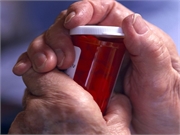- Could Your Grocery Store Meat Be Causing Recurring UTIs?
- Are You Making This Expensive Thermostat Error This Winter?
- Recognizing the Signs of Hypothyroidism
- 10 Strategies to Overcome Insomnia
- Could Artificial Sweeteners Be Aging the Brain Faster?
- Techniques for Soothing Your Nervous System
- Does the Water in Your House Smell Funny? Here’s Why
- Can a Daily Dose of Apple Cider Vinegar Actually Aid Weight Loss?
- 6 Health Beverages That Can Actually Spike Your Blood Sugar
- Treatment Options for Social Anxiety Disorder
Prescriptions for Discredited COVID Drugs Surged 2,000% After Trump’s Support

A new study finds that prescriptions rose sharply for two anti-malarial drugs that President Donald Trump claimed could help prevent or treat COVID-19.
This happened despite the fact that multiple studies found the medicines might only bring harm to patients with coronavirus illness.
The study, conducted by researchers at Harvard-affiliated Brigham and Women’s Hospital in Boston, found that prescriptions for the two drugs — hydroxychloroquine and chloroquine — rose by a staggering 2000% during the week of March 15 to March 21.
Early in the pandemic, Trump repeatedly touted hydroxychloroquine and chloroquine as a potential means of preventing or treating coronavirus illness.
On March 21, Trump tweeted, “HYDROXYCHLOROQUINE & AZITHROMYCIN, taken together, have a real chance to be one of the biggest game changers in the history of medicine.” Azithromycin is an antibiotic often used to fight infections.
But a slew of studies have all found that any early promise from the drugs has quickly fizzled.
Research conducted at multiple sites found that hydroxychloroquine provides no benefit to patients, and has even been tied to a higher rate of dangerous heart arrhythmias and death.
In fact, safety concerns over hydroxychloroquine prompted the World Health Organization to remove the drug from a global trial of potential COVID-19 therapies earlier this week.
Still, Trump said on Sunday he had just finished taking a two-week course of the malaria drug to guard against COVID-19 infection after two White House staffers tested positive for the coronavirus.
The new study sought to determine what influence statements made by Trump and others might have had on patient requests for hydroxychloroquine and chloroquine.
“There have been indications that hydroxychloroquine prescribing had increased and shortages had been reported, but this study puts a spotlight on the extent to which excess hydroxychloroquine/chloroquine prescriptions were filled nationally,” study co-author Dr. Haidar Warraich said in a hospital news release.
His team tracked prescribing rates over a 10-week period: Feb 16 to April 25. Comparing rates to the same dates one year ago, the researchers tracked data on prescriptions for hydroxychloroquine/chloroquine, the antibiotic azithromycin, and the other top 10 most prescribed drugs in the United States.
They found that between March 15 and 21 prescriptions for azithromycin, amoxicillin and the painkillers hydrocodone/acetaminophen declined, and rates for heart medicines remained stable.
In contrast, there was a dramatic surge in prescriptions for hydroxychloroquine/chloroquine: from 2,208 prescriptions in 2019 to 45,858 prescriptions in 2020 — an increase of more than 2,000%.
And over the full 10 weeks of the study, there were an excess of almost a half-million prescription “fills” of hydroxychloroquine/chloroquine compared to the year before.
“This analysis doesn’t include patients who were prescribed hydroxychloroquine/chloroquine in a hospital setting,” Warraich noted. “This means that patients could have been taking the drugs at home, without supervision or monitoring for side effects.”
Hydroxychloroquine/chloroquine are legitimately used by people with lupus to help control the immune disorder. But the Brigham team say they noticed a concurrent decline in the types of long-term prescriptions those patients might require — suggestive of a shortage.
In fact, the U.S. Food and Drug Administration began to report a drug shortage of hydroxychloroquine beginning on March 3, the researchers noted.
All of this has physicians concerned.
Dr. Matthew Heinz is a hospitalist and internist at Tucson Medical Center in Arizona. Reacting to Trump’s announcement earlier this month that he was taking the drug, Heinz said that, “I cannot stress enough how reckless it is to encourage anybody to take hydroxychloroquine or any other unproven remedy for SARS-CoV-2.”
“Chloroquine and hydroxychloroquine are not benign substances and can cause serious, sometimes life-threatening, adverse effects,” including sometimes fatal cardiac arrhythmias, he noted. “This is especially true when so many people already have underlying cardiac and other medical conditions — they are even more susceptible to such side effects.”
The new study was published May 28 in Journal of the American Medical Association.
More information
There’s more about COVID-19 facts and rumors at the U.S. Centers for Disease Control and Prevention.
Source: HealthDay
Copyright © 2026 HealthDay. All rights reserved.










